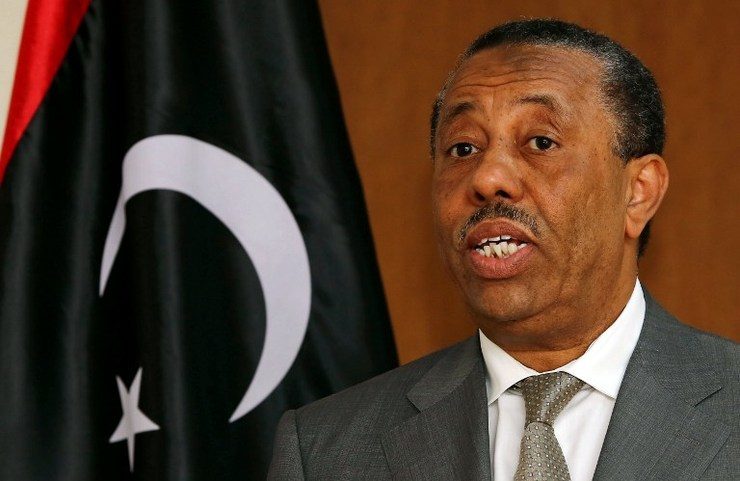SUMMARY
This is AI generated summarization, which may have errors. For context, always refer to the full article.

AL-BAIDA, Libya – The head of Libya’s recognized government has pleaded for more help from the international community, warning that the country could become a dangerous haven for jihadists on Europe’s doorstep.
In an interview with Agence France-Presse ahead of hoped-for peace talks in Geneva this week, Prime Minister Abdullah al-Thani said his government especially needed the lifting of an arms embargo to combat militias defying its authority.
“The international community must cooperate with Libya to put an end to extremism and terrorism and help government institutions, namely the army, by lifting the arms embargo,” Thani said at his headquarters in the eastern city of Al-Baida.
The UN Security Council imposed the arms embargo at the start of Libya’s 2011 uprising, which ousted and killed dictator Moammar Gaddafi, to protect civilians from his forces.
More than 3 years later, Libya is engulfed in chaos and hobbled by rival governments and parliaments as a myriad of armed groups battle for control of territory.
Thani’s government, which is recognized by the international community, and the elected parliament have been based in the remote east since an Islamist-led coalition seized Tripoli in August.
The coalition known as Fajr Libya (Libya Dawn) also holds third city Misrata. It launched a bloody offensive in December to seize control of key oil terminals but was repelled by the army.
Islamists, led by the UN-blacklisted Ansar al-Sharia, also control parts of second city Benghazi in the east and have been locked in battle with pro-government forces since May.
“The international community classified Ansar al-Sharia as a terrorist organization and it is leading an international coalition to crush such groups in Iraq and Syria,” Thani said of the US-led alliance against the Islamic State group.
“But in Libya, the government and armed forces are battling these groups alone, without any support from the international community,” he said.
“We are afraid that the groups that are in Syria and Iraq will infiltrate Libya if they (coalition forces) tighten the noose around them there,” Thani said.
‘Last chance’ talks in Geneva
In November, the Security Council blacklisted Ansar al-Sharia for its ties to Al-Qaeda at the request of Britain, France and the United States.
The measure targets Ansar al-Sharia Benghazi and its sister group Ansar al-Sharia Derna, which pledged allegiance to IS in October.
Jihadists are reported to have set up camps in Libya, including in the remote southern desert, to train militants to fight in Mali, Iraq or Syria.
The brutality of the jihadists was highlighted last week when they claimed to have killed two Tunisian journalists captured in Libya in September.
Since Gaddafi’s fall, authorities have struggled to build a new army and police force and complain that they are ill-equipped to confront jihadists.
After backing the revolt against Gaddafi with air strikes, Western governments have been wary of intervening again in Libya.
President Francois Hollande earlier this month ruled out a unilateral French intervention, saying it was first up to “the international community to live up to its responsibilities.”
The United Nations on Saturday, January 10, announced plans for the new round of talks this week in Geneva, without giving a specific date.
Saying Libya is at a “crucial juncture,” the European Union said the meeting “represents a last chance which must be seized. “
Previous attempts to hold talks in Libya have been repeatedly delayed amid intensified fighting.
The UN Security Council has warned that it would impose sanctions on any party that undermines peace efforts.
Thani said his government was ready for talks, but not with armed groups that refuse to recognize its authority.
“The government will take part in any dialogue aimed at saving the country,” he said, “but we will not sit at the same table as groups who have carried arms against the government and defy its legitimacy.” – Rappler.com
Add a comment
How does this make you feel?
There are no comments yet. Add your comment to start the conversation.